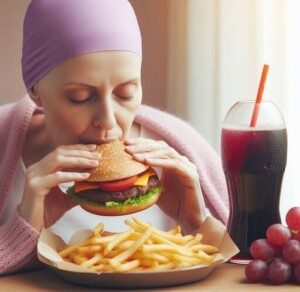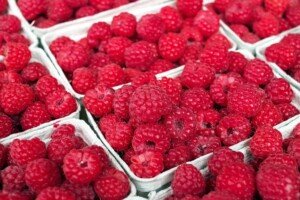
Have you ever wondered why so many cancer patients eat fast food and other processed foods on a regular basis? Why are only drugs prescribed to treat cancer?
I once saw a child, bald as a cue ball from chemotherapy, eating a complete fast food meal at McDonald’s.
One might argue that cancer patients, especially children, suffer enough, so they should be able to eat whatever they want.
But what’s more important: indulging in a food craving or maximizing the patient’s survival odds?
Certainly, an anti-cancer diet won’t cause suffering. There are ways to keep a cancer patient’s spirits up other than with fast food and other foods that are part of SAD: standard American diet.
It’s fair to wonder how many oncologists and general practitioners have a serious talk with their cancer patients about how impactful diet is on fighting cancer.
The oncology residency for doctors-in-training does not cover the ravages of the standard American diet.
Standard American Diet vs. Anti-Cancer Diet
“The same diet that prevents cancer is the same diet that helps one’s body fight cancer — the Whole Food Plant Based Diet,” says Dana S. Simpler, MD, an internal medicine physician with Mercy Medical Center in Baltimore, MD, who specializes in helping patients treat disease with diet and exercise.
“Population studies show that countries that eat diets based on animal products like we do in the U.S. — beef, chicken, pork, fish, eggs, milk and cheese — have much higher rates of cancer than those whose diet is predominantly or exclusively plants.
“Of the animal products, processed meats such as bacon, sausage, hot dogs and lunch meats are the worst cancer promoters, along with red meat.
“Dairy, too, contains a cancer promoter called IGF-1 – insulin-like growth factor 1 – which encourages cancer cells to grow and is associated with higher rates of breast and prostate cancer.
“There is a very credible study by Dr. Dean Ornish that showed that men with early prostate cancer who adhered to a strict plant based diet had arrest and regression of their cancer compared to men who stayed on the standard American diet.”
Yes, Cancer Loves Sugar; It’s Not a Myth
Dr. Simpler explains, “There is also good evidence that cancer thrives on sugar — so, anyone with cancer should be following a very low sugar diet — no processed sugars — only sugar from natural sources such as fruit.”

And this means whole fruit, not fruit juice in a bottle or carton from the store. It’s okay to add water to the fruit and pulverize it in one of those “Bullet” or “Ninja” devices.
This makes the fruit (and vegetables) drinkable – easier to consume several servings at once.
How much meat or dairy or sugar is safe?
“No one really knows the answer, and someone serious about using their diet to keep their cancer at bay should not eat any animal products or sugar,” says Dr. Simpler.
I’d like to interject here to point out that an oncologist is trained in using drugs and radiation – not nutrition — to treat cancer.
A doctor can become board certified in one or more specialties, of which there are many.
Thus far there is no medical specialty, that one can become board certified in, called “nutritional cancer therapy” or the like.
Dr. Simpler continues, “However, if one is not able to be that strict, keeping their animal products down to less than 5-10 % of their total intake seems to be safer.
“That would mean about only one egg or 2-3 oz. of beef, chicken, fish or pork for an entire day – with the rest of the diet rice, beans, grains, vegetables and fruit.
“Keep sugar to as close to none as one can possibly stand. Read the book SUPER IMMUNITY by Dr. Joel Fuhrman.”


























